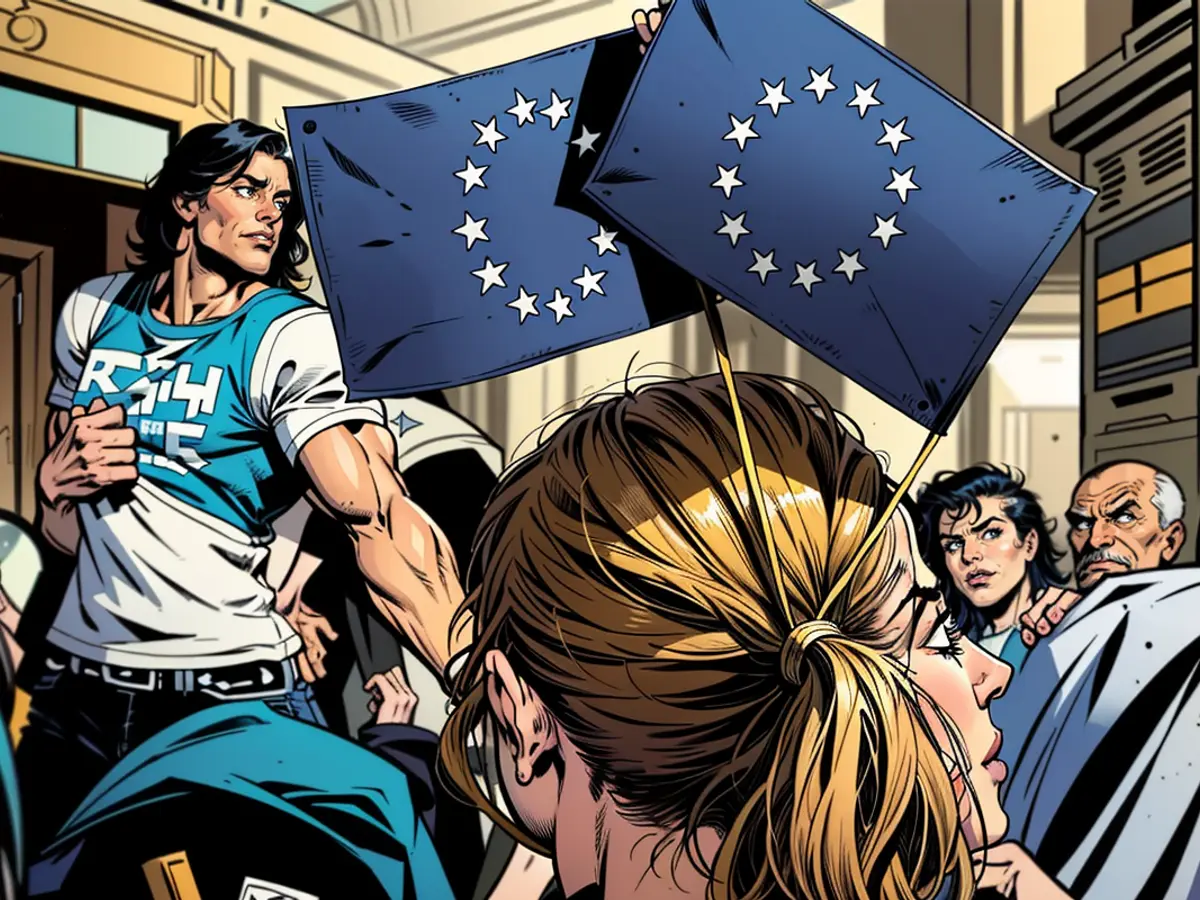"The practice of power by the people." - Political groups conclude their EU campaign with rallies and public displays.
European Election Campaign Wraps Up in Germany
The European election campaign in Germany has concluded with gatherings, protests, and pleas for voting participation. German Chancellor Olaf Scholz defended his Ukraine policy at the SPD's election concluding gathering in Duisburg on Saturday, emphasizing that there will be no NATO soldiers in the country. Nonetheless, France is considering deploying military trainers to Ukraine.
In several metropolises, individuals took to the streets the day before the election to protest against far-right extremism. Communities like Berlin, Hamburg, Munich, Cologne, and Dresden reportedly witnessed over 15,000 people participating in these demonstrations.
The campaign has been riddled with assaults on politicians throughout its duration. In Dresden, an AfD member experienced an attack on Saturday. Similarly, Danish Prime Minister Mette Frederiksen had to postpone a series of engagements after a physical assault on Friday night.
Scholz: No NATO Soldiers in Ukraine
"We'll continue to prevent escalation," Scholz stated at the SPD's last gathering in Duisburg. He underscored this ideal with a clear statement from US President Joe Biden and himself: "No soldiers from our countries will be in Ukraine, and neither from NATO." France is contemplating the deployment of military trainers to Ukraine in partnership within, but without the participation of the US. Scholz emphasized that German support could be summarized as "Caution, Caution, Caution."
Merz: Support the Conservatives, Continuity in Europe
CDU leader Friedrich Merz encouraged voters in his weekly letter to supporters and prospective backers on Saturday to cast ballots in the European election. He commended incumbent EU Commission President Ursula von der Leyen (CDU), noting her international respect and credibility. Voters could "link a clear note to the traffic light in Berlin with their vote for continuity in Europe," Merz wrote.
Voting Already in Progress in Other Countries
While German parties were still promoting their respective platforms on Sunday, voting was underway in other nations: Czech Republic since Friday, Malta, Latvia, Slovakia, and Italy (ending Sunday), as well as Ireland and the Netherlands. In total, 360 million citizens in all EU member states have the power to choose who will represent them in the European Parliament for the next five years. 96 seats will be allocated to Germany; 65 million German residents are eligible to vote. The newly elected parliament will convene in Strasbourg on July 16 for its inaugural plenary session.
Campaign Characterized by Political Violence
The election culmination in Germany was marked by violence against politicians, with SPD General Secretary Kühnert reminding the audience in his address on Saturday about the attack on SPD politician Matthias Ecke in Dresden in early May. He condemned the use of physical force in political discourse, encouraging people to "tolerate each other, to negotiate with each other using words." In Dresden, another incident occurred: Saxon AfD legislator Hans-Jürgen Zickler was beaten up by a man at a ballot box.
Prime Minister Frederiksen of Denmark was subjected to an assault by a man in the inner city of Copenhagen on Friday. The attack resulted in a mild neck injury. Her office assured that the leader is "otherwise in good health, but shaken" by the event. A 39-year-old man was arrested and will stand trial. The reason behind the attack remained unclear.
Slovak Prime Minister Robert Fico spoke out on Saturday about his condition, having been discharged from the hospital after being assaulted. He shared a photo on Facebook showing himself leaning on crutches, placing his ballot paper into a mobile ballot box.
Right-wing parties are believed to have a strong chance of performing well in several of the 27 EU nations during these elections, such as Austria, France, and Italy. The CDU and CSU may emerge victorious in Germany, as suggested by polls. The SPD, Greens, and AfD are neck-and-neck, according to current projections.
Read also:
- Urging citizens to participate in the voting process, Olaf Scholz concluded the SPD's European elections campaign rally in Duisburg.
- Despite the emergence of right-wing extremism in demonstrations across Europe, political groups continue to advocate for democracy during their election campaigns.
- In a bid to affirm Germany's stance on Ukraine, Chancellor Scholz emphasized NATO's absence in the conflict during the European elections campaign in Berlin.
- As the European elections approach, the SPD is under increasing pressure to address right-wing extremism and police intervention in political discourse.
- In Dresden, the Polish embassy organized a European elections rally promoting unity and cooperation between Germany and Poland.
- With the European election campaign drawing to a close in Germany, attention turns to France, where a rally against President Macron's policies has sparked controversy.
- SPD General Secretary Nobel Kühnert addressed the party's European elections campaign rally in Duisburg, addressing concerns over right-wing extremism and violence.
- Multiple cities in Germany, including Dresden, Hamburg, Munich, and Cologne, have reported escalating levels of right-wing extremism during the European elections campaign.
- Friedrich Merz, the CDU leader, has made a final plea to voters ahead of the European elections, urging them to support the party's campaign for continuity in Europe.
- Amidst rising levels of right-wing extremism during the European elections campaign, Germany's police force has come under scrutiny for their handling of protests and rallies.
- In Dresden, SPD politician Matthias Ecke was targeted by right-wing extremists during the European elections campaign, raising concerns over the safety of political figures.
- In the European Parliament elections, campaigns in France and the Netherlands have been marred by allegations of EU funding misuse and calls for accountability.








